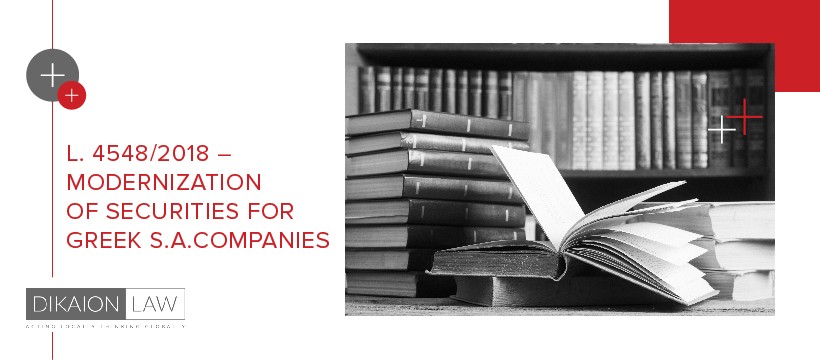
Societe Anonyme is the cornerstone capital company, in Greek Corporate law, when undertaking business risks, with its capital acting as a counterweight to the limited liability of its shareholders. The shareholders secure their participation in the company through the acquisition of shares, however a public limited company can issue many more securities besides the shares, which are in fact of the greatest interest.
An SA issues the following types of securities:
a) Shares : (common, preference, redeemable, earmarked/committed). All the shares issued are mandatory nominal.
Common: Offer rights on the profit and voting rights and are, as their name implicates, the most common category.
Preference : Can be issued without the right to vote (art. 38 par.4 l. 4548/2018) and are an exception to the principle of shares’ equality of art. 36. Their issuance facilitates the coverage of the share capital in case of an increase, rather than as a reward to the existing shareholders.
The privileges deriving from the preference shares are not specified in the law, but the most common of them are:
a. Entitlement to the distributed dividend before the common shares
b. Preferential return on capital paid by the holders of preferred shares from the product of the reduction of the capital or the liquidation of the corporate property
c. Preferential payment of dividend, for the years for which no dividend was paid.
d. Determination of a fixed dividend or participation with a certain percentage in the profits
e. Right to receive a certain interest.
Any other privileges provided in the Statute of a company.
Preference shares without voting rights provide all the other rights deriving from the shareholding relationship and are convertible, provided that when they are issued there is the relevant provision.
Redeemable : These shares can be issued by the company (article 39 par. 1 law 4548/2018) either as common either as privileged with (or without) voting rights. The important thing in this case is that these shares are required to be redeemed by the issuing company either with a statement of the latter or of the participating shareholder.
Earmarked/Committed : Their transfer is subject to the approval of the company or other restrictions provided by the statute.
b) Bonds : These bonds are called corporate bonds and can only be issued by a societe anonyme and are debt securities. They are issued after concluding a bond loan, ie a large loan with a long-term repayment. The bonds have a nominal value, not in the sense of the nominal value of the shares, but in the sense of what amount they will return at maturity, as well as a nominal interest rate (coupon rate).
c) Warrants : Αre those issued by a societe anonyme and provide the beneficiary with the well-known stock option to acquire, ie to buy shares of the company. The option gives the investor the right, but not the obligation, to buy or sell a share at an agreed price and date. There are two types of options: puts, which is a bet that a stock will fall, or calls, which is a bet that a stock will rise.
d) Founding securities : They are provided in exchange for specific actions of the founders of a company during its establishment. The number of founding securities may not exceed one tenth (1/10) of the number of shares issued. These securities have no nominal value and do not provide a right to participate in the management or administration of the company, nor in the proceeds of the liquidation of its assets.
While the types of securities issued by an SA. provided by Law 4548/2018 are four and are specific, its closed corpus "splits" with the following two provisions:
1. the provision of the titles that will be issued based on a special law, which are not known in advance, but are left to the discretion of the legislator, who acts on the basis of a kind of "authorization" provided by Law 4548/2018.
2. the existence of unlimited categories (for example there the share that is a type of a title and its various categories, common, privileged, etc.), but also the existence of more series (class a΄, b '), which perform more visual project, rather than functional. Legally, the classes of the titles have no differences, nor do they provide different rights, as long as they have the same face value.

